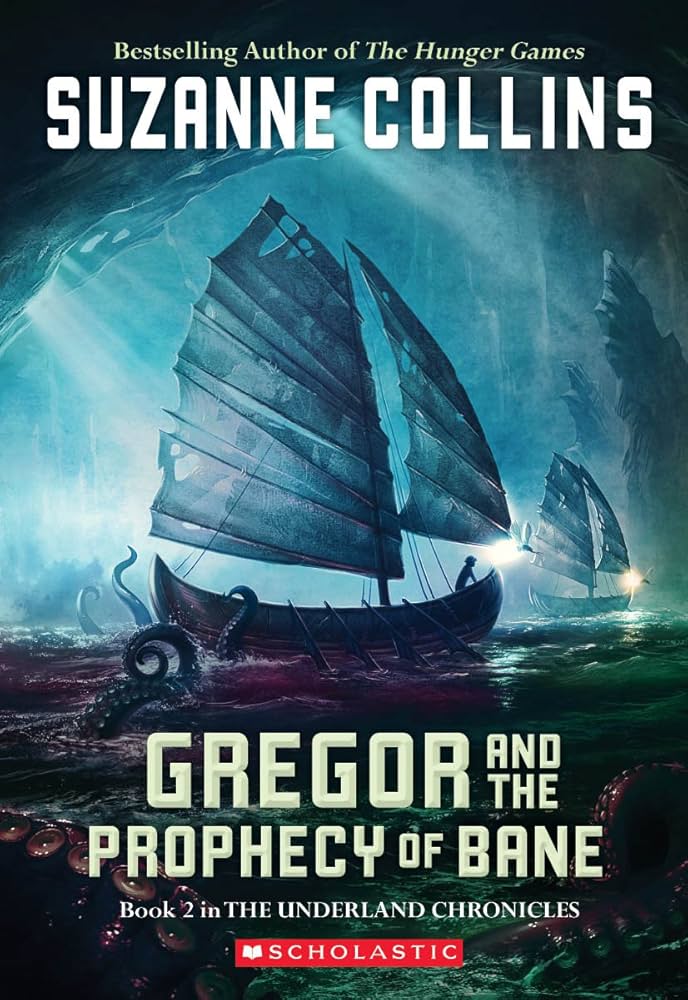
Gregor and the Prophecy of Bane
Chapter 3
by Suzanne, Collins,Gregor finds himself in immediate danger as Underland rats chase him through the dark tunnels. Realizing he can’t outrun or outfight them, he hastily hides in a circular stone opening leading to the Waterway, only to remember rats rely on smell, not sight. The rats quickly discover his hiding spot and mock him, forcing Gregor to choose between facing them or dropping into the abyss. As the rats lunge for him, he lets go, free-falling into the darkness, hoping for rescue.
During his fall, Gregor hears Ares, his bat ally, urging him to drop. Ares catches him midair, revealing he retrieved Gregor’s lost flashlight. Relieved, Gregor vents his anger about the cockroaches kidnapping his sister, Boots, and demands Ares take him to them immediately. Ares, however, diverts course toward Regalia, sparking Gregor’s frustration. Their tension escalates when Gregor insists on going to the roaches, leading Ares to flip him onto a ridge and pin him down.
Ares confronts Gregor, accusing him of behaving like Henry, his former bond who treated him as a servant. Gregor, startled by Ares’s fury, denies the comparison but acknowledges he interrupted the bat. Ares emphasizes he’s not subordinate and is working to reunite Gregor with Boots. The confrontation forces Gregor to reflect on his actions, though he struggles to reconcile his urgency with Ares’s authority.
The chapter highlights the strained but vital partnership between Gregor and Ares. Gregor’s desperation to save Boots clashes with Ares’s insistence on mutual respect, revealing their unresolved dynamic. The tension underscores Gregor’s growth as he navigates trust and leadership in the Underland, while Ares’s past trauma with Henry adds depth to their bond. The chapter ends on an unresolved note, setting the stage for further conflict or collaboration.
FAQs
1. What dilemma does Gregor face when hiding from the rats, and why is his hiding spot ineffective?
Answer:
Gregor attempts to hide inside a circular stone opening leading to the Underland’s Waterway, hoping the rats won’t see him. However, this plan fails because rats rely on their keen sense of smell rather than sight to track prey. The chapter highlights Gregor’s realization of this mistake: “The rats didn’t need to see anything… utterly worthless if you were trying to lose rats.” This forces him to choose between climbing out to face the rats or dropping into the unknown darkness below.2. How does Ares challenge Gregor’s assumptions about their relationship, and what does this reveal about their bond?
Answer:
Ares asserts his autonomy when Gregor demands to be taken to the roaches, flipping him onto a ridge and stating, “I do not take orders from you.” This confrontation reveals tensions in their bond, as Ares compares Gregor’s behavior to his former bondmate, Henry, who treated him as a servant. The scene underscores that their partnership—while rooted in mutual loyalty—requires respect and communication, not command. Gregor’s eventual apology (“Okay, I’m sorry”) hints at growth in understanding their equal dynamic.3. Analyze the significance of Gregor’s free-falling experiences in the chapter. How do they reflect his emotional state?
Answer:
Gregor’s free-fall evokes past traumas (falling after Boots and leaping to save his father), emphasizing his recurring vulnerability: “This is something I’m never going to get used to.” The physical sensation mirrors his emotional turmoil—helplessness over Boots’ kidnapping and panic when pursued by rats. Yet, Ares’ rescue symbolizes hope amid chaos. The parallel falls underscore Gregor’s resilience but also his lingering fear of losing control in the Underland’s unpredictable environment.4. How does the chapter use humor to contrast Gregor’s desperation with the rats’ menace?
Answer:
The rats mock Gregor’s hiding attempt with taunts like, “Come out, come out, wherever you are!” Their “nasty, raspy laugh” and imagined rolling on the ground create dark humor, heightening the absurdity of Gregor’s plight. This contrast amplifies the tension: while Gregor fears for his life, the rats treat the situation as a game. The irony underscores their predatory superiority and Gregor’s precarious position, making his eventual escape more dramatic.5. What does Gregor’s reaction to Boots’ kidnapping reveal about his character and priorities?
Answer:
Gregor’s immediate anger at the roaches—”Did they think I wouldn’t come get her?“—shows his fierce protectiveness and impulsivity. His rant about “Patty Cake” and demands to Ares highlight his single-minded focus on family, even at the expense of rational planning. However, this also blinds him to Ares’ perspective, revealing a flaw: he struggles to balance emotion with collaboration. His priorities are clear (Boots’ safety), but his approach risks alienating allies like Ares.
Quotes
1. “He had two choices. Climb back out and face the rats in pitch blackness, or drop into the darkness below and hope against hope that some Underlander scout found him before he drowned or became something’s dinner.”
This quote captures Gregor’s dire predicament and the constant life-or-death decisions he must make in the Underland. It highlights the relentless danger and uncertainty of his journey to rescue Boots.
2. “‘I do not take orders from you, Overlander. Let us be clear on this from the start. I do not take orders from you!’”
Ares’s fierce declaration marks a pivotal moment in their relationship, establishing boundaries and challenging Gregor’s assumptions. This confrontation reveals the complex dynamics of their bond and Ares’s lingering trauma from his past with Henry.
3. “‘And right now I am wondering if I should not have let you both fall because, like Henry, you are under the impression that I am your servant.’”
This emotionally charged statement exposes Ares’s deep resentment and the parallels he draws between Gregor and his former bond, Henry. It underscores the bat’s struggle with trust and autonomy after betrayal.
4. “‘Get off my chest, what?’ said Ares. ‘Try again,’ said Ares. ‘Because to me this sounds very much like an order.’”
This tense exchange demonstrates the power struggle between Gregor and Ares, emphasizing communication breakdowns and the bat’s insistence on mutual respect. It shows Gregor being forced to confront his own demanding behavior.
